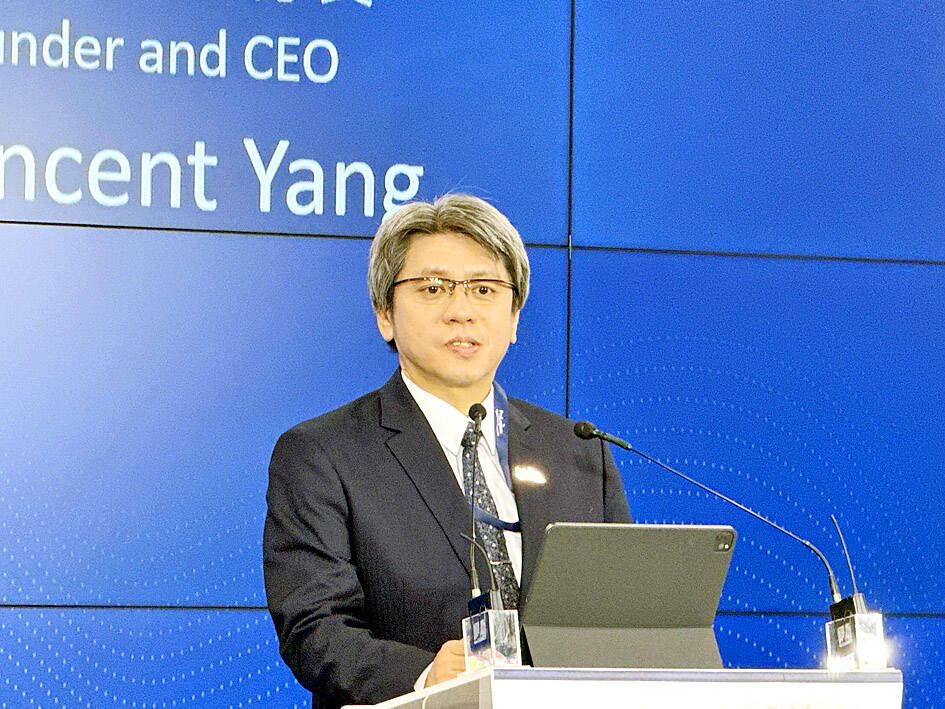ProLogium Technology Co (輝能科技) expects the first electric vehicle (EV) equipped with its solid-state lithium battery to hit the road later this year, the company said yesterday in Taoyuan as it launched the world’s first factory for solid-state batteries for commercial use.
The factory is poised to supply up to 26,000 EVs when it reaches full capacity of 2 gigawatt-hours (GWh) a year, ProLogium Technology said.
The company has invested NT$4.2 billion (US$134.07 million) in the facility, which has initial capacity of 0.5GWh a year, or enough batteries for up to 14,000 vehicles, it said.

Photo: CNA
“This is the world’s first [solid-state lithium battery] mass-
production line, mainly targeting electric cars. EV [automakers] are our future partners,” company founder and chief executive officer Vincent Yang (楊思?) told a media briefing.
“Some projects may enter mass production this year,” Yang said, declining to name which automakers would make such a breakthrough.
Mercedes-Benz is one of ProLogium Technology’s shareholders and has been collaborating with the Taiwanese firm to adopt cost-effective and safer lithium batteries in its next-generation vehicles. Vietnamese automaker VinFast also holds an unspecified stake in ProLogium.
There are also plans for the Taoyuan plant to produce solid-state batteries for electric aircraft, other vessels, drones, robots and devices used in the aerospace industry, Yang said.
The new facility would serve as a demonstration factory for global expansion, particularly in Dunkirk, France, where ProLogium plans to build a 5.2 billion euro (US$5.65 billion) factory, the company said.
The French factory, which is to have an annual capacity of 48Gwh, is to enter mass production in 2027, Yang said.
The company aims to become the world’s biggest solid-state lithium battery supplier between 2030 and 2032, when its French factory reaches full capacity, he said.
By that time, ProLogium would have a 35 to 40 percent share of the world’s solid-state lithium battery market, if the penetration of solid-state lithium batteries makes up 7 percent of the global battery market, he said.
ProLogium expects the manufacturing costs of solid-state lithium batteries to drop to match the costs of ternary lithium batteries — about US$100 per kilowatt-hour — in 2032, Yang said.
ProLogium is the world’s sole supplier for extreme ultraviolet lithography (EUV) tools, a crucial piece of semiconductor manufacturing equipment, as its batteries are able to perform in extreme low-pressure environments, he said.
The Taoyuan factory is expected to serve the company’s Asian customers, while the French site would focus on Europe, the firm said, adding that it would not rule out building a factory in the US to tap that market.

Nvidia Corp chief executive officer Jensen Huang (黃仁勳) on Monday introduced the company’s latest supercomputer platform, featuring six new chips made by Taiwan Semiconductor Manufacturing Co (TSMC, 台積電), saying that it is now “in full production.” “If Vera Rubin is going to be in time for this year, it must be in production by now, and so, today I can tell you that Vera Rubin is in full production,” Huang said during his keynote speech at CES in Las Vegas. The rollout of six concurrent chips for Vera Rubin — the company’s next-generation artificial intelligence (AI) computing platform — marks a strategic

Enhanced tax credits that have helped reduce the cost of health insurance for the vast majority of US Affordable Care Act enrollees expired on Jan.1, cementing higher health costs for millions of Americans at the start of the new year. Democrats forced a 43-day US government shutdown over the issue. Moderate Republicans called for a solution to save their political aspirations this year. US President Donald Trump floated a way out, only to back off after conservative backlash. In the end, no one’s efforts were enough to save the subsidies before their expiration date. A US House of Representatives vote

REVENUE PERFORMANCE: Cloud and network products, and electronic components saw strong increases, while smart consumer electronics and computing products fell Hon Hai Precision Industry Co (鴻海精密) yesterday posted 26.51 percent quarterly growth in revenue for last quarter to NT$2.6 trillion (US$82.44 billion), the strongest on record for the period and above expectations, but the company forecast a slight revenue dip this quarter due to seasonal factors. On an annual basis, revenue last quarter grew 22.07 percent, the company said. Analysts on average estimated about NT$2.4 trillion increase. Hon Hai, which assembles servers for Nvidia Corp and iPhones for Apple Inc, is expanding its capacity in the US, adding artificial intelligence (AI) server production in Wisconsin and Texas, where it operates established campuses. This

US President Donald Trump on Friday blocked US photonics firm HieFo Corp’s US$3 million acquisition of assets in New Jersey-based aerospace and defense specialist Emcore Corp, citing national security and China-related concerns. In an order released by the White House, Trump said HieFo was “controlled by a citizen of the People’s Republic of China” and that its 2024 acquisition of Emcore’s businesses led the US president to believe that it might “take action that threatens to impair the national security of the United States.” The order did not name the person or detail Trump’s concerns. “The Transaction is hereby prohibited,”